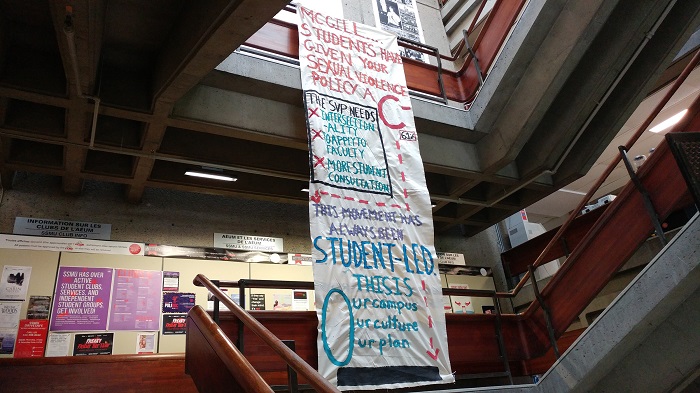On Oct. 11, The Students’ Society of McGill University (SSMU) held a press conference following the official release of Our Turn, a national student-led action plan to end campus sexual violence. The action plan evaluated 14 Canadian universities’ sexual assault policies, and gave McGill’s a C- (61 per cent) grade.
The National Our Turn Action Plan is a student-written commitment to eliminating sexual violence and rape culture on campuses, supporting survivors, creating a culture of survivor-centrism at institutions, and promoting policy reform on both provincial and national levels. Action Plan is composed of five steps that serve as a guide for student unions seeking reform to campus sexual violence policies. So far, 14 student unions from universities across eight provinces have signed on to the plan, including SSMU.
Our Turn is spearheaded by Caitlin Salvino, Carleton University class of 2017, along with Kelsey Gilchrist and Jade Cooligan Pang. It was first initiated at the Carleton University Students Association in October 2016 when the university released its Sexual Violence Policy. Our Turn members drafted a letter suggesting reforms to the Policy regarding the protection of survivors of sexual violence who wished to pursue a formal complaint process through the university. Salvino shared the current goals of the action plan at the press conference.
“Our Turn exists because our institution failed us, because the schools and the government that have all the power are not supporting survivors on campuses,” Salvino said. “[Our Turn is] student-run, underfunded, but [is] still doing everything we can to make these changes happen.”
During the press conference, SSMU Vice-President (VP) External Connor Spencer explained that the movement to end sexual violence on campus started with students.
“At McGill specifically, the conversation has always resided at the student level,” Spencer said. “It was the students who pushed for the creation of a policy, and ultimately it was a working group of students who were told by administration ‘If you want a policy then show us one.’ Just because we have a sexual violence policy […] does not mean we are at the end of this conversation about the sexual violence that happens every day on this campus.”
The release of the action plan follows a long history of student-led sexual assault activism on McGill’s campus. Among groups that advocate for survivors in the Community Disclosure Network (CDN), a grassroots, confidential network of organizers who support sexual violence survivors seeking non-traditional methods of justice. The CDN employs anonymous third-party reporting mechanisms, direct action, guerilla tactics, and confrontational strategies. Committed to self-education, internal accountability, and intersectional politics, the CDN aims to fill gaps where they see them.
One survivor of sexual assault present at the conference, Alex*, spoke to The McGill Tribune about their experience with sexual violence on campus. Because of their lack of faith in McGill’s sexual assault survivor support system, they left Montreal for over a month after the assault. Eventually, they sought help from the CDN, which helped ensure their safety and comfort on campus.
“I hope that McGill and campuses across Canada commit to improving their mechanisms of justice and accountability,” Alex said. “It will take more than a policy to combat sexualized and gendered violence on university campuses, make no mistake. But to our minds at the CDN, without a policy that supports survivors who seek out institutional processes, there can be no justice.”
*Name changed to protect the anonymity of the source.








